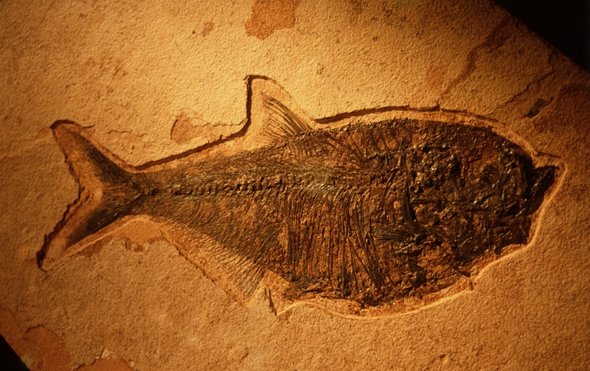(单词翻译:单击)
听力文本
This is Scientific American — 60-Second Science. I'm Christopher Intagliata.
The fossil record is far from being a complete library of everything that's ever lived.
"The vast, vast majority of everything that's ever lived has completely decayed away, bones and all, even, you know, fur, animals that have bones and shells. So fossilization is a very rare occurrence." Duncan Murdock, a research fellow at the Oxford University Museum of Natural History.
"But then if you play the numbers game and think about how many organisms have lived, then fossilization is kind of inevitable, that some things will get into the fossil record."
But what parts of an organism fossilize—and in which stage of decomposition—can vary, meaning it can be hard to reconstruct a living animal from what's represented in rock. Plus, most of the fossil record is bones and teeth. To find any evidence of the soft-tissue of ancient animals is incredibly rare.
So, to learn more about the process of decay and fossilization that can preserve soft tissue, Murdock and his team dissect marine animals, like hagfish and lampreys, as they lie rotting in the lab. The study of how organisms become preserved is called taphonomy. And it can stink.

"Yeah I mean it's certainly a very smelly place to work sometimes." Smelly, but it gives them a step-by-step look at how creatures' bodies change as they decay.
"The first signs the animal is decaying, is the very softest tissues like the guts and eyes start to decay away, and then fine structures like the gills. And then things like the fins start to fall off, and you start to see the skin falling apart. And then eventually all that you're left with are some little bits of cartilage, and remnants of the muscle blocks."
They break down their work in the journal Palaeontology—and make the case for why rotting flesh may give a fresh look at the fossil record. Because what you don't find—and the degraded state of the material you do find—have their own stories to tell about the history of life on Earth.
Thanks for listening for Scientific American — 60-Second Science. I'm Christopher Intagliata.
参考译文
这里是科学美国人——60秒科学。我是克里斯托弗·因塔利亚塔。
化石记录远不止保存曾生存过的各种生物的完整记录那么简单。
“在曾生存过的所有生物中,绝大多数都已经完全腐烂了,比如骨骼,甚至是皮毛以及那些有骨骼和贝壳的动物。因此石化现象是极为罕见的。”牛津大学自然历史博物馆的研究员邓肯·默多克说到。
“但是,如果你玩个数字游戏,想想有多少生物曾经存在过,那石化是不可避免的,有些东西会进入化石记录。”
不过生物体的哪些部分会石化、在腐烂的哪个阶段石化,这是会有差别的,这意味着我们很难用化石中呈现的信息来重现活体动物。另外,大多数化石记录是骨骼和牙齿。发现古代生物软组织的任何证据是极为罕见的。
因此,为了深入了解可以保存软组织的腐烂过程和石化过程,默多克和团队在实验室解剖了腐烂中的盲鳗、七鳃类等海洋动物。这种聚焦生物体如何保存的研究被称为“埋葬学”。研究过程可能伴随着恶臭。
“对,有时工作的地方的确非常臭。”虽然有臭味,但是这项研究使他们得以一步步地观察生物尸体在腐烂过程中是如何变化的。
“动物腐烂的第一个迹象是,由内脏和眼睛等最软的组织开始腐烂,然后是鳃等精细结构。接下来,鱼鳍等组织脱落,动物皮肤开始破碎。最后留下的是一些软骨组织和肌肉块残余。”
他们在《古生物学》期刊中分析了他们的研究成果,并对腐烂的肉为何能为化石记录研究提供新的角度进行了说明。原因是,你没有发现的东西,以及你发现的退化状态物质,都在用自己的故事讲述地球的生命史。
谢谢大家收听科学美国人——60秒科学。我是克里斯托弗·因塔利亚塔。
译文为可可英语翻译,未经授权请勿转载!
重点讲解
重点讲解:
1. be far from 根本不;远远不;
The boardroom strife at the company is far from over.
公司董事会的明争暗斗还远没有结束。
2. fall off (从接合处)脱落,掉落;
When your exhaust falls off, you have to replace it.
如果你的排气管脱落,应将其更换。
3. fall apart 散架;垮掉;摔碎;
When we do not handle unexpected events and the interpersonal elements well, our schedules fall apart.
当我们没有办法处理好未预料到的事情和人际关系时,我们的日程表开始支离破碎。
4. break down 分解;分析;
Well let's break down 5 possible reasons why 2012 will not be the end of the World as we know it.
那么让我们来分析一下2012年不是世界末日的5个可能原因就会清楚这一点。


